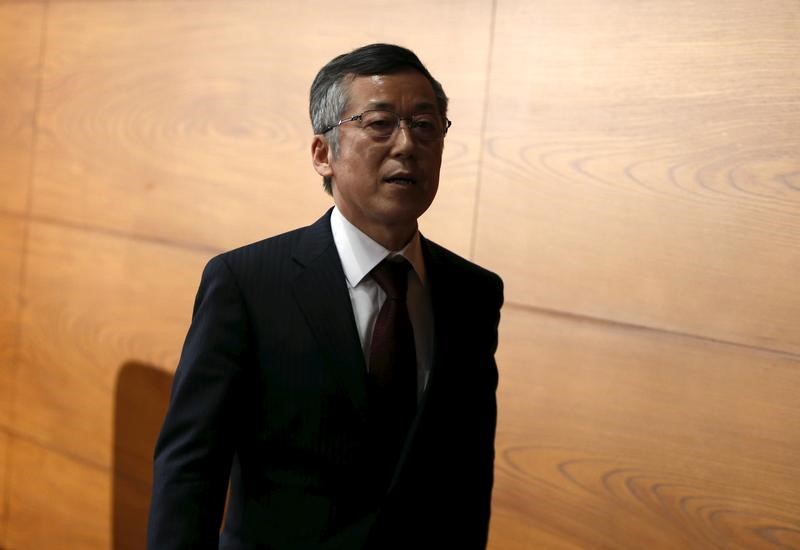 © Reuters. Newly-appointed Bank of Japan board member Harada leaves a news conference at the BOJ headquarters in Tokyo
© Reuters. Newly-appointed Bank of Japan board member Harada leaves a news conference at the BOJ headquarters in Tokyo2/2
By Tetsushi Kajimoto
TOKYO (Reuters) – Bank of Japan board member Yutaka Harada warned on Wednesday that raising interest rates quickly would severely damage financial institutions, underscoring market views that the central bank would go slow in exiting crisis-mode stimulus.
However, Harada, a vocal advocate of bold monetary stimulus, noted the degree of easing could weaken before inflation reaches the BOJ’s 2 percent target. The central bank needed to examine both the costs and benefits of its easy-money policy, he said.
Harada noted that inflation maintained its momentum due to a tightening output gap, and could reach 2 percent if the jobless rate fell below 2 percent from the current 2.2 percent – a near 26-year low.
The BOJ estimates Japan’s output gap at a decade-high of plus 1.71 percent – meaning actual demand in the economy exceeded its maximum potential capacity by that much.
“If interest rates are actually hiked, that would lower bond and stock prices, hurt businesses through a rise in the yen, and increase credit costs, which would hit financial institutions hard,” Harada said in the text of a speech to business leaders in the western Japanese coastal city of Kanazawa.
Harada, a former academic, has voted with the majority of the BOJ’s board including its decision in 2016 to shift to targeting interest rates instead of the pace of money printing.
The central bank should continue its current easing policy, which is having its intended effects, in order to achieve its 2 percent inflation target, Harada said. Further easing would be needed if inflation pressure subsided, he added.
FURTHER EASING
The BOJ is seen lagging well behind other central banks in unwinding crisis-mode stimulus, but investors expect no further easing because of concerns that its massive money printing is hurting the bond market and bank profits.
The central bank is likely to cut its price growth forecasts at a policy meeting ending on July 31 as long-term inflation expectations stall, sources told Reuters on Tuesday.
At that meeting, the central bank’s board will conduct a quarterly review of its long-term growth and price projections, and scrutinize why inflation remains stubbornly weak.
Annual core consumer inflation, which includes oil products but excludes volatile fresh food costs, held steady at 0.7 percent in May, well below the BOJ’s 2 percent target.
“To achieve the 2 percent price goal, the current jobless rate needs to fall further,” Harada said. “That doesn’t mean that we should continue monetary easing until the jobless rate hits 2 percent though.”
Harada is considered as among those on the nine-member board who promote the positive effect that massive injections of money could have on the economy and inflation, rather than emphasizing the demerits of prolonged easing such as the hit to banks’ margins.
Still, he has steered clear of calling for ramping up stimulus, distancing himself from the view of board member Goushi Kataoka who argues the BOJ should ease further to ensure its price goal is met quickly.
Fusion Media or anyone involved with Fusion Media will not accept any liability for loss or damage as a result of reliance on the information including data, quotes, charts and buy/sell signals contained within this website. Please be fully informed regarding the risks and costs associated with trading the financial markets, it is one of the riskiest investment forms possible.
Source: Investing.com




























